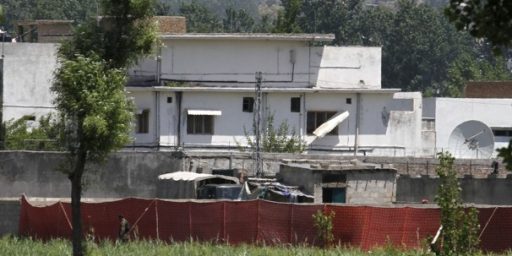Explaining Hitchens
Mark Kleiman has asked for someone to explain Christopher Hitchens’ latest Slate article to him. Since Kleiman doesn’t have a comments section and doesn’t live in these parts, making it unlikely I’ll run in to him, I suppose this post will have to do.
The piece in question, What Went Wrong: The flaw in Seymour Hersh’s theory, isn’t one of Hitchens’ best, but given that he’s one of the two or three best journalistic writers of his generation, that’s a rather high standard to hold him to. Still, his argument seems reasonably straightforward.
Hersh notes that Rumsfeld and company were frustrated by legalistic wrangling that allowed some opportunities to take out key al Qaeda leaders including Mullah Omar.
These, and many other bureaucratic and butt-covering obstacles, according to Hersh and others, engendered such frustration at the top of the Pentagon that ruthless methods were discreetly ordered and discreetly applied. Thus, from the abysmal failure to erase Mullah Omar comes the howling success in trailer-porn tactics at Abu Ghraib.
More than one kind of non sequitur is involved in this “scenario.” And very obviously, the conclusion can exist quite apart from the premises. (There would have been sadistic dolts in the American occupation forces in Iraq, even if there had not been wavering lawyerly fools in the Tampa center that was monitoring Afghanistan.) One needs to stipulate, once again, that the filthy images from Abu Ghraib are not bad because they look bad, but bad because they are bad. Yet is it as obvious as it seems that only the supporters of the war have any questions to answer here?
I ask this because, in the news cycle that preceded the Iraq atrocities, the administration was being arraigned from dawn until dusk for the offense of failing to take timely measures against the Taliban and al-Qaida. I hardly need to recapitulate the indictment here. We had our chance to see it coming, and to see where it was coming from, and the administration comprehensively blew all these chances, from the first warnings of suicide-hijacking to the cosseting of Saudi visa applicants. I might add that I completely agree with all these condemnations and wrote about many of them (including the spiriting of the Bin Laden relatives out of the country during a “no-fly” period imposed upon the rest of us) at the time.
But there is no serious way of having this cake and scarfing it. I remember a debate I had with Michael Moore–the newly crowned king of the Cannes Film Festival–at the more modest location of the Telluride Film Festival in 2002. Ridiculing the Bush administration’s policy, he shouted that it had gone into Afghanistan to get Osama Bin Laden and Mullah Omar. “Mission NOT accomplished!” he added, to roars of easy applause. I asked myself then, and I repeat the question now: Would the antiwar camp have approved the measures necessary to ensure those goals? If they will the end, will they will the means? Would they taunt that lawyer in Tampa, as they taunt the supporters of regime change, with living a quiet life at home while others die in the field? Isn’t the refusal to take out the leaders of al-Qaida a bit of a distraction from the struggle against al-Qaida?
My interpretation of this is that the anti-war Left has simultaneously hounded the Administration for failing to be sufficiently aggressive in combating terrorism–constantly noting that we haven’t yet found Osama, blaming Bush for not stopping 9/11, etc.–and been outraged when they took aggressive action that required suspending legal niceties. This seems like a fair point to me, although one that can be applied in a bipartisan manner. (The Right has claimed that Clinton should have stopped al Qaeda in its tracks years ago but was hollering “wag the dog” any time Clinton took military action during the second term.)
The “bad because they are bad” business breaks the flow of the argument. It is, presumably, an acknowlegment that, while aggressive tactics are justified in the war against jihadists, these particular tactics were reprehensible and those responsible should be punished. The point of stating that obvious point at that place in the essay seems to be that, while the pro-war forces should acknowledge abuses committed in their casue, the other side should admit that its demand that we should play the game strictly according to Hoyle has unpleasant logical consequences as well.
Update: Ted Barlow queries in the comments, “OK, what is flaw in Seymour Hersh’s theory? That’s the ostensible subject of the piece.”
The flaw in Hersh’s piece is the unestablished causal link. Clearly, there were policies set at OSD level that allowed more aggressive action at the operational level. Perhaps they even contributed in some way to the climate at Abu Ghraib. But the specific actions that we’re seeing depicted are a quantum leap from giving Special Forces types the ability to shoot terrorist leaders without a note from their lawyers. Further, as Hitchens points out, decent people wouldn’t interpret an order to soften people up–assuming such actually was in place–to mean that they should sexually abuse them, let alone carry out that action with apparent sadistic enthusiasm.
Update: Ted has an essay on this at Crooked Timber, some of the comments to which are longer than his post, Mark’s post, my post, and the Hitchens article combined.






OK, what is flaw in Seymour Hersh’s theory? That’s the ostensible subject of the piece.
Thus far, the most serious flaw I’ve seen in Hersh’s theories is that Hersh isn’t credible enough to be believed on his own.
I’ll note, for clarity, that his credibility is damaged in the “folks should confirm this independently” sense, and not in the “ignore anything he says” sense.
Craig,
Correct me if I’m wrong, but that’s your theory, not Hitchens’. Right? Hitchens doesn’t question Hersh’s journalistic integrity as far as I can see.
But Hitchens piece depends on misdirection to make that point. The only change in policy that Hitchens mentions are combat policies that prevent soldiers in the field from attacking suspected targets without permission.
Hitchens pretends that these rule changes are the heart of Hersh’s argument, then says there’s no connection between combat rules and the treatment of prisoners. Here’s Hitchens:
But the non sequitur exists only in Hitchens’ deceptive presentation. Hitchens never mentions the changes that were made to loosen the rules about the handling of prisoners. His piece falls apart as soon as readers click on the New Yorker link and read Hersh’s actual report.
Your argument is defensible. I don’t necessarily agree with it, but it’s an intelligent argument that doesn’t depend on my ignorance of Hersh’s piece to work. Hitchens, on the other hand, creates a deceptive cartoon of Hersh’s piece, and then says that his cartoon doesn’t make sense. Of course it doesn’t.
It appears that the comment that I was responding to is gone. Such is life.
sorry I wasted 5 mins of my life going to the ted barlow link.
From the article and comments, in short, “Weee hatess Hitchensss foreveeer”.
Except for My Lai, when has Sy Hersh been right. But, for the “Bush Lied,…” crowd, that makes him infallible. yawn. next!